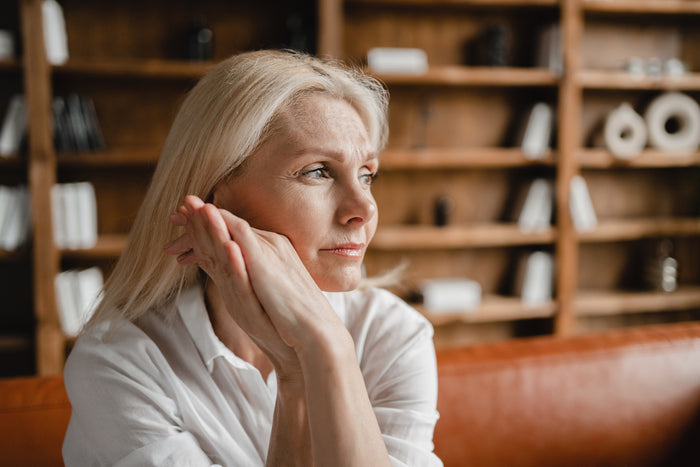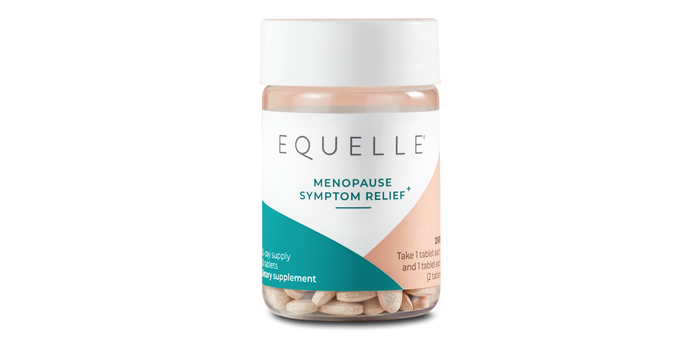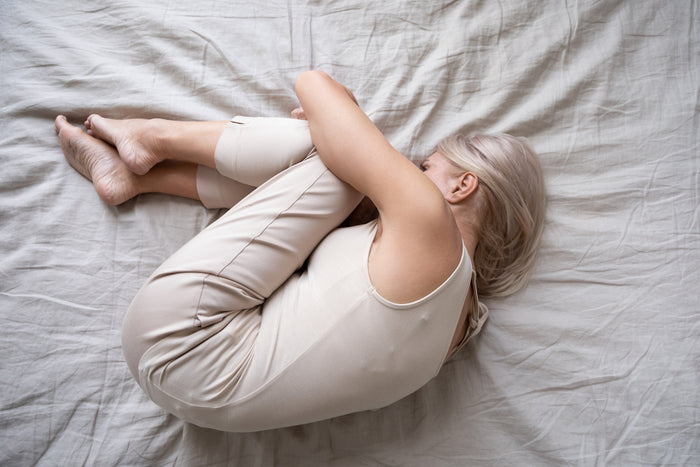You have no items in your cart
What Causes a Low Sex Drive During Menopause?
Low sex drive during menopause may be caused by a drop in estrogen and testosterone, which
are the sex hormones responsible for getting you aroused and performing other reproductive
functions.

Equelle Symptom Relief
The only estrogen decline symptom relief supplement with S-equol, a plant-based ingredient derived from soy that safely and naturally mimics estrogen - relieving hot flashes, improving sleep, and more.

Many women going through menopause notice a reduction in their sex drive over time.
Though
frustrating, low sex drive during menopause is normal and can improve with the right treatment.
The drop in estrogen that comes with menopause affects the vagina in various ways, including:
● Reduced blood supply
● Vaginal dryness (less lubrication caused by a reduced blood supply)
● Vaginal atrophy (thinning of the vaginal walls)
A key part of enjoyable sex is vaginal lubrication. When the vagina doesn’t have enough lubrication, too much friction can occur, causing sexual intercourse to become too painful for many women to enjoy.
Remembering how painful sex is as a result of vagina dryness can also negatively impact a woman’s interest in sex.
Another obstacle to overcome is a change in sensitivity; reduced levels of sex hormones make sexual stroking and touching less pleasurable, making it harder to get aroused or reach orgasm.
The drop in estrogen that comes with menopause affects the vagina in various ways, including:
● Reduced blood supply
● Vaginal dryness (less lubrication caused by a reduced blood supply)
● Vaginal atrophy (thinning of the vaginal walls)
A key part of enjoyable sex is vaginal lubrication. When the vagina doesn’t have enough lubrication, too much friction can occur, causing sexual intercourse to become too painful for many women to enjoy.
Remembering how painful sex is as a result of vagina dryness can also negatively impact a woman’s interest in sex.
Another obstacle to overcome is a change in sensitivity; reduced levels of sex hormones make sexual stroking and touching less pleasurable, making it harder to get aroused or reach orgasm.

Other ways menopause can affect sex drive
Aside from the drop in hormones being a direct cause of low sex drive, other menopause-
related symptoms and physical changes can also reduce interest in sex.
● Mood-related menopause symptoms such as irritability and depression can make you lose interest in enjoyable activities or make it hard to sustain arousal.
● Night sweats and hot flashes are common menopause symptoms. When they occur frequently and with high intensity, these symptoms can leave you too exhausted for sexual intercourse.
● Weight gain is a physical change many women in menopause experience. Some women feel uncomfortable with their
● Mood-related menopause symptoms such as irritability and depression can make you lose interest in enjoyable activities or make it hard to sustain arousal.
● Night sweats and hot flashes are common menopause symptoms. When they occur frequently and with high intensity, these symptoms can leave you too exhausted for sexual intercourse.
● Weight gain is a physical change many women in menopause experience. Some women feel uncomfortable with their
How to Increase Libido and Have Better Sex During Menopause
Whether you’re experiencing low libido as a direct result of hormone reduction or due to other
menopause symptoms, there are ways to increase your sex drive when you reach menopause.
● Soy isoflavone: When taken as food or supplements, soy isoflavones mimic the activity of estrogen in the woman’s body,. This provides relief from estrogen -related menopause symptoms.
● Water-soluble lubricants: Vaginal lubricants can provide help if vaginal dryness is responsible for your loss of interest in sex. Vaginal lubricants are applied topically to reduce friction and by extension, the pain you will experience without the lubrication.
● Exercise: Sufficient exercising will help you lose weight and keep fit. Exercise activities also release endorphins into your bloodstream, resulting in positive emotions and a better mood.
● Communicate with your partner: Open communication with your sexual partner can boost intimacy, a key factor in enjoyable sex. Letting your partner know what you’re going through will help your partner understand why you’ve been withdrawn and together, you can find solutions that’ll get you in the mood.
● Find ways to relax: Put yourself in a safe environment by distracting yourself with things like music, a warm beverage, etc. to reduce anxiety and increase relaxation.
● Keep things interesting: Try spending more time in foreplay to incorporate unique activities into your routine and experimenting with your partner to find things that are fun, exciting, and new.
● Soy isoflavone: When taken as food or supplements, soy isoflavones mimic the activity of estrogen in the woman’s body,. This provides relief from estrogen -related menopause symptoms.
● Water-soluble lubricants: Vaginal lubricants can provide help if vaginal dryness is responsible for your loss of interest in sex. Vaginal lubricants are applied topically to reduce friction and by extension, the pain you will experience without the lubrication.
● Exercise: Sufficient exercising will help you lose weight and keep fit. Exercise activities also release endorphins into your bloodstream, resulting in positive emotions and a better mood.
● Communicate with your partner: Open communication with your sexual partner can boost intimacy, a key factor in enjoyable sex. Letting your partner know what you’re going through will help your partner understand why you’ve been withdrawn and together, you can find solutions that’ll get you in the mood.
● Find ways to relax: Put yourself in a safe environment by distracting yourself with things like music, a warm beverage, etc. to reduce anxiety and increase relaxation.
● Keep things interesting: Try spending more time in foreplay to incorporate unique activities into your routine and experimenting with your partner to find things that are fun, exciting, and new.
Can Low Libido Stop After Menopause?
With good management and enough time, low libido can improve after menopause. It is a
normal occurrence for women in menopause, but it doesn’t have to be a permanent fixture.
It never hurts to speak to your doctor or see a sex specialist to rule out other factors (aside from hormonal imbalance) that may be affecting your libido.
It never hurts to speak to your doctor or see a sex specialist to rule out other factors (aside from hormonal imbalance) that may be affecting your libido.

